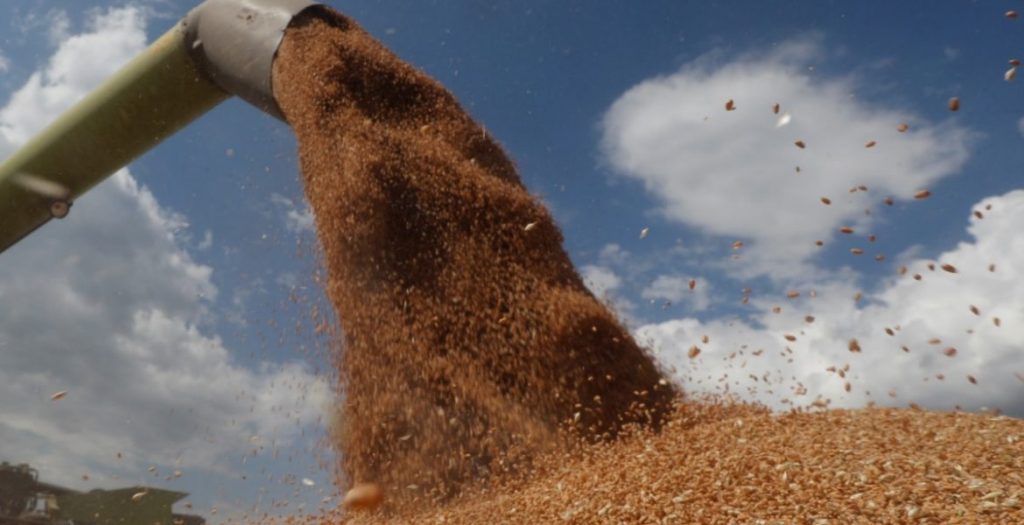Even before the invasion of Ukraine, the Russian Navy had been blocking maritime freight routes for the export of Ukrainian grain. Amid the ongoing war, for the fifth month in a row, Ukraine has been deprived of the opportunity to sell crops to its key markets in Asia and Africa, and prevented from keeping stable the operations of the UN World Food Programme. According to Bloomberg’s estimates, by year-end, in the best case, Ukraine will have been able to export through its sea ports a little more than 2 million tons of grain out of the more than 20 million tons blocked in the country’s storag silos.
The Russian army is plundering captured silos in the south and east of Ukraine. The stolen grain is exported to Crimea and Russia before being forwarded to the Middle East. Sergei Aksyonov, the so-called “head” of the Russian occupation administration in Crimea, has confirmed that grain is exported from Kherson and Zaporizhia regions to the annexed territory of Crimea before being delivered to the ports of Sevastopol and Kerch.
Putin no longer hides the fact that Russia has been illegally exporting Ukrainian grain, and offers to “exchange” it for the lifting of Russia sanctions. During his visit to Iran on July 19 before meeting with Turkish President Recep Tayyip Erdogan, Putin said the US should remove all restrictions on the export of Russian grain “if they want to improve the situation on the food market.” “We will facilitate the export of Ukrainian grain, but we assume that all restrictions related to the supply of Russian grain will be removed. No one has objected so far, including our American partners,” the Russian president cynically stated. In addition, the Russian leader announced this year’s increase in Russian grain exports from 30 million tons to 50 million.
It’s not difficult to guess that this is about stolen Ukrainian grain. There are many documented cases where Russians exported grain from the southern and eastern regions of Ukraine and delivered it to the ports of the Middle Eastern nations. Before entering the Black Sea, Russian ships turn off their location trackers. Ships reappear on radar halfway to their intended destinations.
Russia delivered Ukrainian grain to 15 ports around the world. Most often, the ships docked at the coast of Turkey. Russian vessels check into nine Turkish ports: Deringe, Iskenderun, Nemrut, Samsun, Bandirma, Marmara, Karasu, Mersin, and Atakas. In addition, bulk freighters delivered grains illegally taken from farmers to the Syrian ports of Latakia and Tartus, to Israel’s Haifa, Iran’s Amirabad, and the ports of Pota (Georgia) and Beirut (Lebanon).
Delta Streamline LTD (Malta), Amur Shipping LTD (Russia), Traveler Shipping LLC (Russia), Silverline Shipping LLC (Russia), “Donmaster LLC (RF), Sormovo Ship LLC (Russia), and Victoria River & Sea Transport LTD (Turkey) are all involved.
The “sellers” of the stolen grain are Russian companies OJSC Petrokhleb-Kuban (tax No. 2310109650); OJSC Company Aprel (2311232047); OJSC Krasnogvardeyskiy Elevator (9105010531); JSC TD Fregat (2462040308); JSC Agro-Fregat (6141055691); OJSC Grain Logistic (6167196351); OJSC Afina (6161095847); and JSC Hlebkom (2308100890).
Russia stole and exported from the temporarily occupied territories of Ukraine grains and oilseeds worth more than $613 million. Currently, the total amount of agricultural losses due to the ongoing Russian invasion stands at $27.6 billion, of which the largest share is damage due to the failure to harvest winter crops ($1.4 billion) and destroyed equipment ($926 million).
Ukraine is counting on a quick and decisive response from the EU, the US, and other partners that are part of the sanctions coalition. The effort should result in including on the sanctions list all companies involved in illicit trade, as well as introducing restrictions to prevent such crimes in the future.
Everyone involved in the shipment or sale of grain stolen in Ukraine should be aware of their inevitable accountability. Bulk carriers, ports, ship owners, insurance and brokerage firms, as well as buyers, should all be sanctioned.
James Wilson

